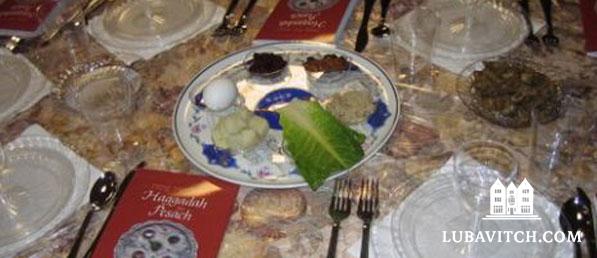(lubavitch.com) In a tight economy, Chabad representatives muster smarts and efficiency to host large seders and bring Passover to their communities. Purchasing Passover staples, and helping out families in need adds up. Lubavitch.com spoke to a handful of resourceful representatives who are pulling off Passover in a pinch.
Bulking Up on Matzah
Matzah weighs in as a bulk cost for Rabbi Eliyohu and Dena Schusterman of Chabad of Intown in Atlanta, GA. Handmade matzah, the kind favored by Chabad is selling at a breathtaking $22 a pound and up. Even downgrading to mass-marketed handmade batches, available at supermarkets catering to large Jewish populations, only cuts the cost by a few dollars per pound. To make ends meet, Rabbi Schusterman rounded up enough matzah orders to qualify for a wholesale shipment and is passing the savings along to his community members.
Calculating Chewing Capacity
Keeping matza quantities realistic helps, too. Chabad representatives have learned from their years observing the munching at community Seders that most participants will consume about a board to a board and a half of matzah. Experienced Seder leaders have learned that they’re best bet is to buy just enough matzah, especially since the cost of matzah plummets mid-Passover week when retailers slash prices to get rid of the costly crackers.
Big Box Judaica
With Chabad representatives, bargain hunting for Seder supplies has turned up a surprising ally in IKEA.
One Chabad rep spotted a six-pack of glass wine cups at the mass furnishings retailer, just the right volume to fill the Passover Seder’s required four cups. The price—under $5 for all—nearly beat out disposable goblets, and the representative spread the word to fellow Chabad reps. Rabbi Zushe and Dini Gurevitz of Chabad of Abington, PA are hosting their first communal seder this Passover, so they’re shopping list is longer than most, since they’ll be starting from scratch. The wine glasses are a great deal, says Mrs. Gurevitz, they are “the perfect size, and the price is right.”
Doing the Math with Wine
Too bad kosher wine isn’t available from big box stores. At least purchasing the right quantity of this budget behemoth requires no guesstimate. To buy enough for one seder takes simple math, says Rabbi Schusterman. Four cups, at a measure of 3.5 ounces required per pour means 14 ounces per person, about a half bottle each. He’s hunted down wine at close to wholesale price, to provide libations for his community.
But even with a bulk discount, the costs mount.
Sliding Scale Seder
Covering costs with a student population can be a challenge in the best years. With a slumped over economy, “some students do not have the resources that they used to have, so we adapted our pricing structure,” says Rabbi Hershey Novack, director of Chabad on Campus, Rohr Center for Jewish Life serving Washington University and campus communities throughout the region.
To attend Chabad’s campus Passover Seder, students in St. Louis have the option to pay an open-ended amount, from zero to an $1800 sponsorship.
Giving students the option of attending the Seder without charge, simply by clicking on the zero mark at the web-reservation page is “more respectful of the students than having them ask for a scholarship,” says Rabbi Novack. “Students who can are proud to donate a greater amount. This helps educate a new generation of philanthropists,” he says.
Chabad representatives are finding, however, that Jewish people of all levels of affiliation are willing to become partners in bringing Passover experiences to those in need.
In the Philly suburbs area, Rabbi Gurevitz received an enthusiastic response to an email asking his community to sponsor seats at the community Passover seder for families who are unable to pay.
“People realize the Seder is an important part of being Jewish and they want to be part of the mitzvah,” says Rabbi Gurevitz.
With Philadelphia’s unemployment rate still neck and neck with the national average of 10.6%, according to the US Bureau of Labor Statistics, some of the money raised will be given to Philadelphians who have been laid off. “This year the money we raise on one block will be given to people living just a few blocks away,” Mrs. Gurevitz says.
Mrs. Gurevitz is already deep into Passover cleaning and planning the food she will need for the eight-day holiday. “The logistics are huge. I’ve been thinking about it since Purim,” Mrs. Gurevitz says.
She’s received to-do-lists and other advice about prioritizing from friends and fellow Chabad representatives. The lists help her to figure out what to clean and what to skip, what to cook first and what freezes well. And, she’s grateful for Chabad’s particular restrictions on Passover food consumption.
In a nutshell, Chabad permits only food your great-grandmother would recognize—peeled. “It helps to keep things simple,” says Mrs. Gurevitz.
And that may be the best budget advice of all.

Be the first to write a comment.